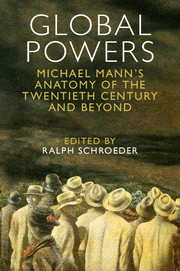Book contents
- Frontmatter
- Contents
- List of contributors
- 1 Introduction
- Part I Theory and history
- Part II Political, economic, military and ideological questions
- 5 On political decency
- 6 Mann on neoliberalism
- 7 Nationalism and military power in the twentieth century and beyond
- 8 History, historical sociology and the problem of ideology: the cases of communism and neoliberalism
- 9 Mann's globalizations and their limits
- Part III American exceptionalism
- Part IV Empire
- Part V Response
- Index
- References
7 - Nationalism and military power in the twentieth century and beyond
from Part II - Political, economic, military and ideological questions
Published online by Cambridge University Press: 05 April 2016
- Frontmatter
- Contents
- List of contributors
- 1 Introduction
- Part I Theory and history
- Part II Political, economic, military and ideological questions
- 5 On political decency
- 6 Mann on neoliberalism
- 7 Nationalism and military power in the twentieth century and beyond
- 8 History, historical sociology and the problem of ideology: the cases of communism and neoliberalism
- 9 Mann's globalizations and their limits
- Part III American exceptionalism
- Part IV Empire
- Part V Response
- Index
- References
Summary
Introduction
Whereas much of the contemporary mainstream sociology remains oblivious to the study of military power and nationalism, Michael Mann has put both of these at the forefront of his comprehensive sociological analyses of the world history. While there is no doubt that Mann has made an unmatched contribution in this area, his analyses also exhibit some weaknesses which come to light most clearly in his studies of the twentieth and early twenty-first centuries. This chapter explores some limits of Mann's IEMP power model and offers alternative explanatory remedies. More specifically I identify conceptual problems and contradictions present in Mann's diagnosis of the relationship between military power, warfare and nationalism in the context of the past 120 years. The chapter aims to demonstrate that Mann's strict separation between political and military power together with his understanding of nationalism as a direct consequence of warfare create some explanatory blind alleys that cannot be accommodated within the existing IEMP model. To deal with these pitfalls, I argue that both nationalism and military power should be analysed through the prism of the three long-term historical processes which make the link between military power, war and nationalism possible: the cumulative bureaucratisation of coercion, centrifugal ideologisation and the envelopment of micro-solidarity. I will try to show that in contrast to Mann's optimistic account that emphasises the worldwide weakening of the military power and decline of warfare (but continuous persistence of nationalism), it is more likely that as the dominant social organisations transform, expand and strengthen so will coercive power, nationalism and war.
Military power
In contrast to much of contemporary sociology, Michael Mann has regularly emphasised the significance of military power in social life. From the early civilisations and modernising empires to the late eighteenth- and early nineteenth-century nation-state formation processes, organised violence has been at the heart of Mann's subtle analyses of social order. Military power has proved decisive in accounting for the key social transformations from the early Mesopotamian world, the Greek city-states, the Roman and Ottoman empires to much of European history all the way to the Napoleonic wars (Mann 1986, 1993). Although in his view the gradual expansion of infrastructural potency of the European states has partially stifled militarism in the nineteenth century, the military might have reached its pinnacle in the two world wars.
- Type
- Chapter
- Information
- Global PowersMichael Mann's Anatomy of the Twentieth Century and Beyond, pp. 117 - 142Publisher: Cambridge University PressPrint publication year: 2016
References
- 2
- Cited by



